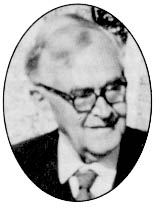
1886-1968
“Jesus Christ, as he is testified to us in Holy Scripture, is the one Word of God which we have to hear and which we have to trust and obey in life and death.”
So reads the first article in the Barmen Declaration, a theological document framed by Karl Barth in May of 1934. It ranks with the famous Protestant confessions of faith. Like them it came to birth at a time when the Church was floundering. Like them it spoke to a Church that had lost sight of its Lord, and had confused the Kingdom of God with the kingdoms of this world.
Nazism insisted that Hitler had the right to control the life and work of the Church. “German Christianity” was in reality no more than a centuries-old paganism wrapped in a flag the world came to dread. The National Church had bent the gospel out of shape as surely as the Swastika was a bent cross.
Lest anyone misinterpret the opening words of the Barmen Declaration (above), a supporting paragraph followed immediately: “We reject the false doctrine that the Church may and must acknowledge as sources of its proclamation other events, powers, forms and truths as God’s revelation beside this one Word of God.”
Barth was a forty-eight year old professor of theology at the University of Bonn when the Gestapo (the Nazi secret police) burst into his lecture and forcibly deported him to his native Switzerland. Before he died, Barth would demonstrate yet again that the Church’s best theology (like its best hymnwriting) emerges form its worst suffering.
Eventually his output was overwhelming: fourteen huge tomes of theology discussing the historic doctrines of the Christina faith as well as contemporary intellectual developments; dozens of shorter works; and four hundred journal articles and books of sermons.
Indisputably the leading Protestant theologian of the twentieth century, Barth was eventually even recognized by the Church of Rome (a teacher to be listened to by Christians of all persuasions). He was wooed by seminaries and churches everywhere. Yet he rarely ventured abroad on speaking engagements, preferring to preach each Sunday afternoon men in prison.
Barth was born in Switzerland, ordained to the ministry of the Reformed Church, and appointed to the village of Safenwil. Wile he busied himself in church and village the world convulsed with the declaration of the First World War in August, 1914. Ninety-three German intellectuals publicly declared their support for the war policies of Kaiser Wilhelm II. Barth was horrified to see virtually all of his former theology professors included in the list of names. At that moment he know they had nothing to teach him; nothing concerning scripture, theology, ethics or history.
Driven back to the New Testament, Barth recognized within its pages the centrality and sufficiency of “the Word made flesh.” He saw that the basis of the Church’s proclamation and pastoral care was not the world’s self-understanding, but rather the very Godness of the God who is “wholly other” than his creation and is therefore “wholly free” to give himself to us and for us.
A commentary on the Book of Romans soon followed. Embodying Barth’s discernment, it “burst like a bombshell on the playground of the European theologians,” according to a Roman Catholic scholar. Controversy erupted and never abated. Yet Barth refused to surrender the apostles’ conviction of the uniqueness of the Incarnation. When he was harassed and mocked by political authorities, university faculties, and ecclesiastical bureaucrats, he insisted that the Church always falls down in unfaithfulness and disgrace when it fails to understand three small words: his only Son.
Throughout World War II one huge volume succeeded another. An Englishman visiting an endangered pastor in Germany was startled at the man’s relief upon receiving yet another thousand pages form Barth: “It was as if a year’s supply of food had come to save a beleaguered city that would otherwise have starved to death.”
Hard at work each day form 7:00 a.m. until midnight, Barth still found time for other pursuits, especially music. He was particularly fond of Mozart, and listened to him daily. In the midst of work-filled days Barth wrote, “. . . Our daily bread must also include playing. I hear Mozart – both younger and older – at play. But play is something so lofty and demanding that it requires mastery. And in Mozart I hear an art of playing as I hear it in no one else. . . . When I hear him, it gladdens, encourages and comforts me as well.”
Barth travelled to America only towards the end of his life. By then he felt he had acquired sufficient English to make the journey, even though he waggishly told people that his English, gained from reading detective mysteries, was “simply criminal.” When asked for advice concerning young people about to enter the ministry he responded without hesitation, “They should know their Bibles and they should love people”
When he was over eighty an elderly woman in a Zurich nursing home wrote to tell him how much his printed sermons meant to her and to the ninety-eight year old resident to whom she red them. He replied, “I have no fewer than eleven honorary doctorates, but none has given me more pleasure than your little letter. . . .” He concluded, “God grant you both more of his incomparable light.” Soon he was dead himself.
He will be remembered as one who recalled the Church to its foundation: Jesus Christ is given to us as Judge, Saviour and Lord inasmuch as the world’s sin renders it both ignorant of its condition and impotent to do anything about it.
It had all been anticipated decades before in a remark of the young pastor in Safenwil: “The little phrase ‘God is’ amounts to a revolution.”
Victor Shepherd